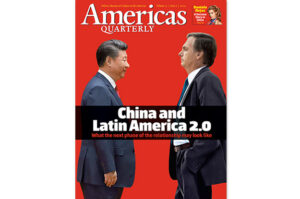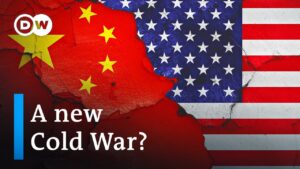Secretary of State Antony Blinken on Thursday outlined competing visions for the future of the international community: one centered around China’s increasingly aggressive and expansive authoritarian one-party state, and another anchored by President Joe Biden’s conception of a bulwark of allies and partners committed to democracy, human rights and the “international rules-based order,” POLITICO reports.
Washington “has developed and implemented a comprehensive strategy” toward Beijing “to harness our national strengths and our unmatched network of allies and partners to realize the future that we seek,” Blinken said in an address at George Washington University. But the U.S. seeks to avoid a new Cold War, he insisted.
 China is certainly endangering democracy in Latin America, observers suggest.
China is certainly endangering democracy in Latin America, observers suggest.
Beijing has successfully asserted itself economically and is now the first or second trading partner of most countries in the region, notes AS/COA’s Eric Farnsworth. And it is clear that China is looking to assert itself politically in the Americas, questioning the value of democracy and undermining democratic institutions, as part of an increasingly aggressive global competition with the United States, he said in testimony to the U.S. Senate today.
The influence of Chinese autocracy has grown rapidly to the point where it begins to supplant Western influence. In 2000, only 1.1 percent of the region’s exports went to China. In 2018, before the pandemic, it was already 21 percent.
But confronting the rise of China does not necessarily entail a new Cold War or the end of globalization, some observers suggest.
While political fears about China are rising in democracies, there’s no widespread momentum to substantially alter trade relations based on human rights or intellectual property concerns, POLITICO reports.

CREDIT: DEUTSCHE WELLE SCREEN GRAB
“It’s too simplistic to say we’re moving towards some kind of a new Cold War, with a liberal world order and an authoritarian world order,” said Alexander Stubb, the former prime minister of Finland who now leads the European University Institute’s School of Transnational Governance. “I think we’ll have more regionalization of globalization, but it’s not going to go away.”
The West will need to adjust: “If we want to work for a rules-based order, it’s not necessarily going to be us setting the rules anymore.”
Former Danish Prime Minister Helle Thorning Schmidt agrees. “We have to find a way to work with China. We [in democracies] have to find ways of working with countries that don’t fully share our values,” she said.
“Ending globalization? Life as we know it would cease to exist,” Columbia University’s Adam Tooze told POLITICO. “When people say this, they’re either naive or apocalyptic,” he said, adding “it’s a bad way of thinking about the problem.” He expects “a reconfiguration of globalization, a rearrangement, and politicization in certain respects of certain relationships.”
China is looking to assert itself politically in the Americas, questioning the value of democracy & undermining democratic institutions, as part of an increasingly aggressive global competition with the U.S., @ericfarns @ASCOA told @senatefrc https://t.co/A2Iso7n0bE
— Democracy Digest (@demdigest) May 26, 2022







